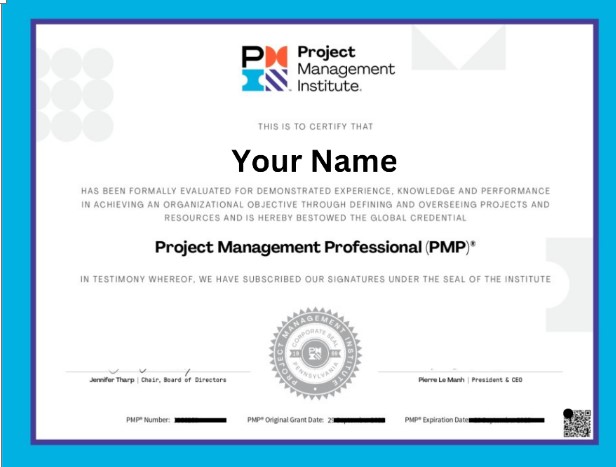The Project Management Professional (PMP) exam is a globally recognized certification administered by the Project Management Institute (PMI), which validates that a professional is well-equipped to be able to manage projects. However, many people struggle with passing this difficult examination on their first attempt. This article will list and explain the top ten reasons why candidates fail in PMP exams and how you can avoid them.
Insufficient Study Time
Underestimating the amount of time required for studying is one of the most common reasons why candidates are not successful in PMP Exams. The PMBOK Guide outlines the five process groups and ten knowledge areas that are covered in the PMP exam.
How to Avoid It: Create a reasonable study schedule that allows for consistency over several months. Try to study between 2-3 hours per day incrementing as you approach your examination date. Also use different study materials such as books, online courses, and practice exams combined.
Lack of Understanding of the PMBOK Guide
An understanding of what is contained inside the PMBOK Guide is crucial if one is to succeed in PMP exams since it serves as their main reference point. Many people do not go through it comprehensively hence ending up failing this test.
How to Avoid It: Fully read the PMBOK Guide and do not simply scan it. Take notes so that you can grasp the concept. Study its principle from other sources in simpler language.
Failure to Practice Exam Questions Adequately
The PMP examination is famous for having complicated and tricky questions. Candidates who do not try out a few test questions may end up being unprepared for the format of the exam as well as the style of questions.
How to Avoid It: Always undertake practice tests to familiarize yourself with the question type and time pressure involved. Do a performance analysis based on your weak areas for improvement purposes.
Memorizing Instead of Understanding
A lot of candidates tend to fall into the trap of cramming instead of understanding what they are reading about. The PMP exam evaluates your ability to apply knowledge, not necessarily recall facts.
How to Avoid It: Understand project management’s process and principles. Make use of case studies and practical examples hence; seeing how these principles are used in real-life situations.
Overlooking Critical Concepts
Some concepts such as Earned Value Management (EVM) are tested more often in PMP exams than others. Candidates who bypass or don’t fully study these areas have a high chance of failing their examinations.
How to Avoid It: Identify the topics that are frequently tested and ensure you have a good understanding of them. Study extra hard on these topics and take practice tests in those areas.
Poor Time Management During the Exam
The PMP exam has 180 questions to be answered in 230 minutes. Failure to manage one’s time properly may result in missed questions, as well as hasty responses.
How to Avoid It: Have a strategy for going through at an even pace during the exam. Make timed exams part of your preparation so that you can get faster and more accurate in answering questions. Allot sufficient time for every question and keep it, putting difficult questions aside for review only if there is time.
Overconfidence or Lack of Confidence
Being too sure may mean unsatisfactory study preparations, whereas feeling less confident might lead to nervousness throughout the examination.
How to Avoid It: Keep an equal tone in all your preparation activities. Read up widely as well as take Mock Exams To Know If You Are Ready To Pass The PMI PMP Exam. Practice reviewing materials that boost your confidence while shunning arrogance.
Not Understanding the Exam Format
The types of questions contained in the PMP exam include; multiple-choice (MCQs), drag and drop, hotspot, etc., hence not knowing them can disadvantage a candidate.
How to Avoid It: Equip yourself with knowledge on any type of question that could come up during this test period. Use online resources and practice exams that mimic the actual test environment.
Ignoring the Importance of Professional Experience
The PMP exam assesses both theoretical knowledge and practical experience. Those candidates who merely rely on books without relating them to their professional experiences may find it difficult.
How to Avoid It: If you have a background in project management, think about this when dealing with concepts from your readings. Take some time to reflect on your past projects and examine how PMI principles were put into use or could have been used.
Inadequate Use of Study Resources
Depending on limited or low-quality study materials can impede your preparation. The enormous number of study materials available can be confusing hence leading to poor selection by some students.
How to Avoid It: You need a mix of good quality study materials such as the PMBOK Guide, PMP prep books, online courses, and study groups among others. Talk to successful PMP candidates for recommendations and read reviews to identify the best resources.
Conclusion
Passing one’s PMP examination demands a strategic approach involving extensive studying, application of learning content practically as well as becoming familiar with the exam format. Understanding why many people fail at this stage therefore enabling them to work on these flaws is important for better passing rates among candidates. To effectively prepare, set aside enough time, make use of high-quality study materials, and draw on your professional background. You can complete the PMP test and obtain your project management certification if you are prepared and have the appropriate attitude.
Views: 1




Leave a Reply